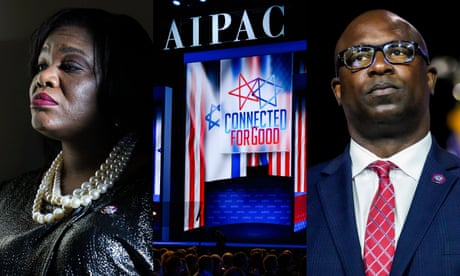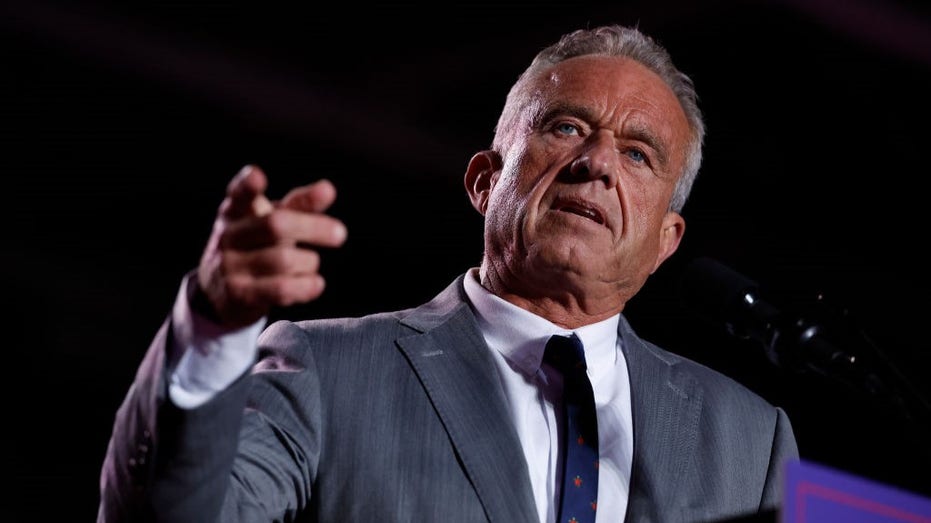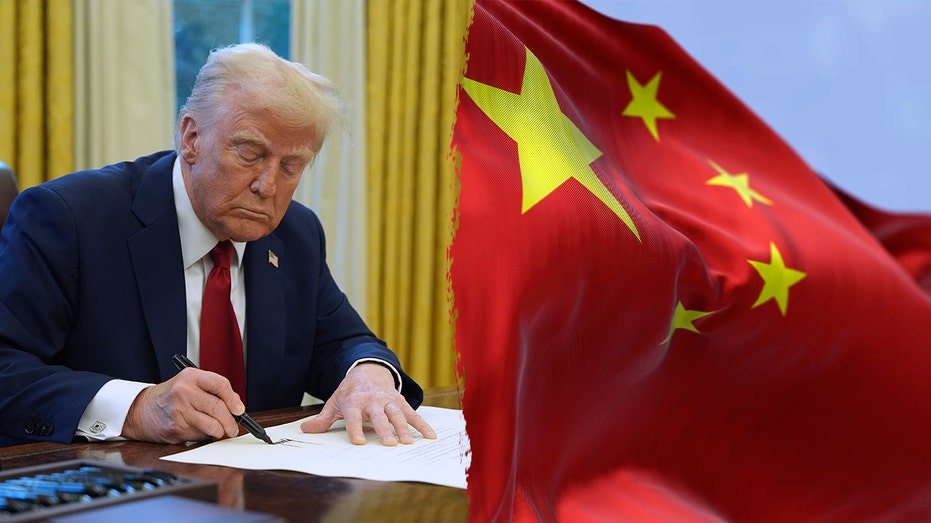- by foxnews
- 08 Apr 2025
Five things we learned from our reporting on the US’s pro-Israel lobby
Five things we learned from our reporting on the US’s pro-Israel lobby
- by theguardian
- 17 Aug 2024
- in politics

The progressive US representative Ilhan Omar of Minnesota easily overcame a primary challenge on Tuesday, delivering a major victory for progressives after a primary season marked by mixed success amid an onslaught of spending from pro-Israel lobby groups.
The progressive "Squad" in the House were early to embrace calls for a ceasefire in Gaza and criticize Israel's offensive for its toll on civilians, drawing the ire of groups like the American Israel Public Affairs Committee (Aipac). Omar and Summer Lee of Pennsylvania were still able to easily cruise to victory in their primaries, but pro-Israel groups successfully picked off its two biggest Squad targets of this primary season: Jamaal Bowman of New York and Cori Bush of Missouri.
The Guardian followed key congressional races affected by Aipac and similar groups for the past few months. With the primaries coming to a close, here's what we learned about the pro-Israel lobby's efforts this year.
The $23m Aipac pumped into defeating just two members of Congress can be seen as evidence of the depth of the pro-Israel lobby's concern that public opinion is shifting away from decades of largely unquestioning support for Israel as the US's "greatest ally", particularly among young Americans. These shifts in public opinion threaten the claims of a bipartisan consensus on support for Israel in Congress.
Aipac's creation of the United Democracy Project (UDP) political action committee in 2021 to directly intervene in election campaigns for the first time was in part a response to opinion polls showing that even before the present war in Gaza, half of Democrats wanted the US to give more support to Palestinians.
The group pledged to spend $100m this election year; it has so far spent more than $90m. Bowman and Bush's races were the two most expensive House primaries in history, according to the firm AdImpact.
Bowman and Bush were elected to Congress on the back of the Black Lives Matter movement, which has focused on reframing the Palestinian cause as a civil rights issue of resistance to Israeli domination. The shift in narrative alarms Aipac, as has the impact of international court rulings against Israel's occupation of the Palestinian territories and a growing consensus within international human rights organisations that Israel imposes a form of apartheid on Palestinians.
The war in Gaza, where Israel has killed at least 40,000 Palestinians, a majority of them civilians, has only added to the challenges now facing the pro-Israel lobby, with a third of Democrats saying Biden has not been "tough enough"with Israel.
Aipac's UDP spent $14.6m in its campaign to unseat Bowman. The group Democratic Majority for Israel (DMFI) spent another $1m to help George Latimer, the Westchester county executive, win the Democratic nomination.
In Bush's primary, UDP spent $8.6m to promote the campaign of Wesley Bell, a St Louis prosecutor, and DMFI contributed close to $500,000 to the effort.
The financial commitment paid off, as both Bowman and Bush went on to lose their primaries. But it's worth noting that Bowman and Bush were already viewed as more vulnerable than some of their other Squad colleagues at the start of the primary season.
Bowman had attracted negative headlines last year for pulling a fire alarm in the Capitol during a crucial vote, an incident that prompted a misdemeanor charge and a formal House censure. Bowman also had to apologize in January for writing some now-deleted blogposts promoting conspiracy theories about the September 11 attacks, and Latimer was helped by redistricting, which brought more of the suburban voters inclined to support him to the district. Meanwhile, the justice department is investigating Bush's spending on security services, after she married her security guard and kept him on her campaign payroll.
Groups like UDP and DMFI chose to focus their attention on lawmakers who already had some kind of baggage heading into their primaries.
Many election watchers expected Lee's primary in Pennsylvania to be the first test of the pro-Israel lobby's strength against the Squad, but UDP and DMFI chose to stay out of the race.
The decision came as somewhat of a surprise, as UDP and DMFI collectively spent nearly $4.4m against Lee when she first ran for Congress in 2022. But the groups opted out of the race this year after Lee spent her first term in Congress building goodwill with her constituents and delivering more than $1.2bn in funding for her district.
The Super Pac Moderate Pac, backed by the Republican mega-donor Jeffrey Yass, did get involved in Lee's race, but it was not enough to prevent her victory. Lee ultimately defeated her opponent, local council member Bhavini Patel, by 21 points.
A similar pattern played out with Omar. She beat Don Samuels, a former Minneapolis city council member, by 13 points on Tuesday after pro-Israel groups chose to stay out of the race. The progressive representative Rashida Tlaib, the only Palestinian American member of the House and one of the most vocal ceasefire supporters, did not even draw a primary challenger.
In races where they did not think they could win, pro-Israel groups simply opted out altogether.
Although pro-Israel groups targeted pro-ceasefire members, their attack ads generally did not focus on the war in Gaza. That choice was strategic, as polls show that an overwhelming majority of Democrats support calls for a ceasefire.
Instead, ads from UDP tried to paint members like Bowman and Bush as uncooperative Democrats sowing discord within the party and more focused on their national profiles than their districts. One UDP attack ad against Bowman specifically called out his votes against the bipartisan infrastructure bill and the debt ceiling agreement, mirroring the group's later attacks against Bush.
"Jamaal Bowman has his own agenda and refuses to compromise, even with President Biden," the ad's narrator says. "Jamaal Bowman has his own agenda, and it's hurting New York."
That strategy, powered by millions of dollars in ad spending, paid off.
Omar knew to expect a significant primary challenge this year because she won her 2022 primary against Samuels by just 2 points. This time around, Omar was prepared. She raised roughly five times as much money as Samuels did, and she deployed ads early as a sort of prebuttal against potential attacks on her voting record.
Lee similarly secured the narrowest possible victory in her 2022 primary, winning by less than 1 point. Two years later, her margin of victory in the primary had grown by 20 points.
Bowman and Bush were less tested, however. In 2022, Bowman won his primary by 29 points, although he tellingly secured only 54% of the total vote. Bush easily won her primary in 2022, beating her opponent by 43 points and securing 70% of the total vote.
This year, it seems that progressives who experienced tougher primary fights in 2022 were better equipped to defend themselves when needed.
But Aipac is not only taking aim at Israel's most strident critics. The millions of dollars poured into defeating Bush and Bowman are a warning shot to other members of Congress and contenders that vocal criticism of Israel or support for Palestinians may come at a political price.
- by foxnews
- descember 09, 2016
Ancient settlement reveals remains of 1,800-year-old dog, baffling experts: 'Preserved quite well'
Archaeologists have recently unearthed the remarkably well-preserved remains of a dog from ancient Rome, shedding light on the widespread practice of ritual sacrifice in antiquity.
read more





